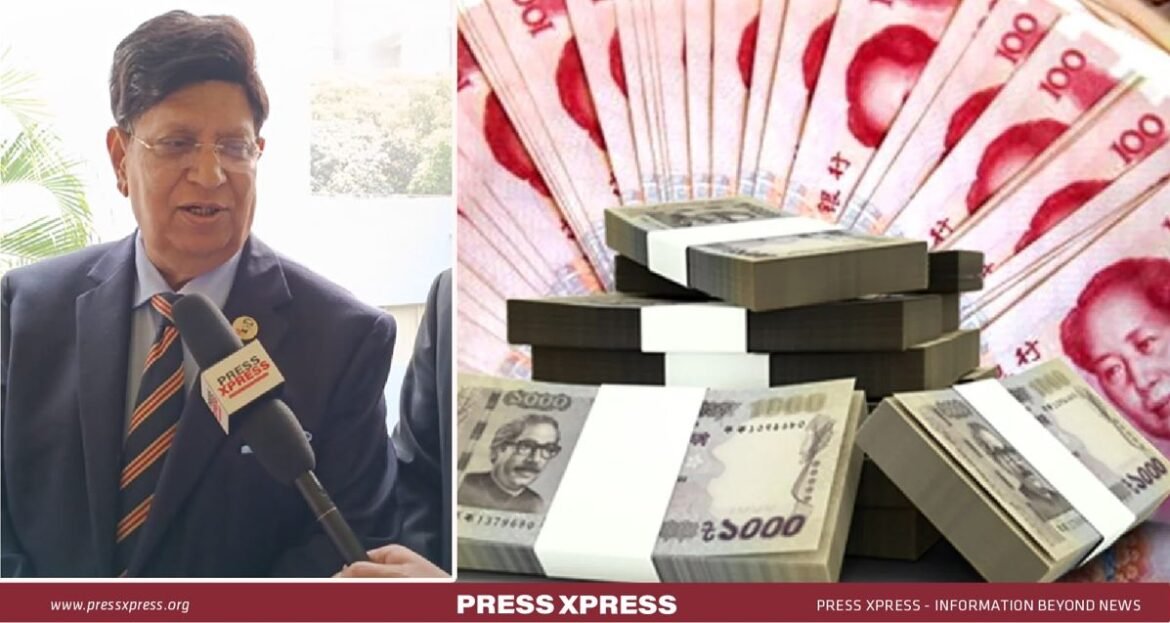Utilizing alternative currencies to alleviate the strain on dollar reserves in countries such as Bangladesh is unavoidable. Prioritizing bilateral currency swaps for trade with China, India, and Russia is crucial for bolstering Bangladesh’s resilient economy.
You can also read: Is China Aiming for World Dominance in Economy, Military, and Diplomacy?
Bangladesh has recently expressed its interest in using the Chinese currency, the yuan, for its bilateral trade with China, the world’s second-largest economy and one of Bangladesh’s largest trading partners.
This move reflects Bangladesh’s desire to diversify its foreign exchange reserves and reduce its dependence on the US dollar, which has been facing increasing challenges from the US sanctions policy and the rise of alternative currencies.
An event encompassing topics that mainly focused on the prospect of using alternate currency usage was held today. Besides the above, other topics discussed were Bangladesh’s GDP, impressive progress in the last fifteen years, and possible challenges to the Bangladeshi economy.
On Friday, February 16th, the ‘Taka- Yuan Trade’ and Bangladesh Dollar Challenge, featuring Dr. A.K Abdul Momen, MP, Former Foreign Minister as chief guest, took place at 10 AM at the Press Club in the capital. The discussion was exclusively supported by the Press Xpress.
Other Notable guests included prominent educators and specialists from Education, Research, and Development Forum.
Key Takeaways from the Event

The Focal point of the discussion focused on the prospect of direct Taka-Yuan trade. With chief Guest Dr. Ak. Abdul Momen discussing the possible challenges and advantages of starting alternate currency trading.
Dr. Momen started his statement by complimenting on how timely the topic discussion is. He specifically thanked Advocate Dr. Mizanur Rahman for his own statement.
Dr. Momen stated that the issue of Yuan-Taka tarde started because of the war in Ukraine and the suspension of SWIFT payment to Russia. Essentially he was referring to the weaponization of the dollar as the primary trigger of seeking alternate trading currency.
Dr. Momen emphasized that the dollar is the trading mechanism of the world and expressed his doubt on how feasible Yuan-taka trade would be; however he also stated that using alternate currencies would ease the pressure on the dollar reserve.

World Moving Away from Dollar

Bangladesh is not alone in its quest to move away from the dollar, which has long dominated the global financial system as the main reserve currency, the medium of exchange, and the unit of account. According to the International Monetary Fund, the share of the dollar in global foreign exchange reserves has declined from 70% in 2000 to 60% in 2020.
The share of other currencies, such as the Euro, the Yen, and the Renminbi, has increased. Many countries have been seeking to diversify their reserves and trade settlement currencies to reduce their exposure to the volatility and risks associated with the dollar, especially in the face of the US sanctions policy, which has been described as the ‘weaponization’ of the dollar.
US Weaponization of Dollar Trade
The US has been using its financial leverage to impose sanctions on countries that it deems as adversaries or violators of its interests, such as Iran, Venezuela, North Korea, and Russia. By cutting off their access to the dollar-based payment system, the US has effectively isolated them from the global economy and imposed significant costs on their trade and development.
However, this strategy has also backfired, as it has prompted many countries to seek alternatives to the dollar and to challenge the US dominance in the financial system. For instance, Russia has been increasing its use of the yuan, the euro, and other currencies for its trade and reserves, after the US and its allies froze about $300 billion of its central bank funds and removed its major banks from the SWIFT payment system in 2022, following its invasion of Ukraine. The US sanctions policy has also alarmed many other countries, who fear that they could be the next targets of the US wrath, and who question the legitimacy and stability of the dollar-based system.
What advantages will yuan-based bilateral trade have for Bangladesh?
Bangladesh, as a developing country with a large trade deficit with China, stands to benefit from using the yuan for its bilateral trade.
First, it would reduce the transaction costs and exchange rate risks involved in converting the taka, the Bangladeshi currency, into the dollar and then into the yuan, and vice versa.
Second, it would increase the availability and affordability of Chinese goods and services, which are essential for Bangladesh’s economic growth and development.
Third, it would enhance the economic and political ties between Bangladesh and China, which have been expanding in recent years through various cooperation initiatives, such as the Belt and Road Initiative, the Bangladesh-China-India-Myanmar Economic Corridor, and the China-Bangladesh Free Trade Agreement.
Fourth, it would diversify Bangladesh’s foreign exchange reserves and reduce its vulnerability to the fluctuations and shocks of the dollar market. As well as the effects of external shocks and allow Bangladesh greater flexibility in its international transactions.
Conclusion
Bangladesh’s request for the operation of a Chinese bank in its territory to facilitate the use of yuan for bilateral trade is a significant step towards the internationalization of the Chinese currency and the diversification of the global financial system. It reflects Bangladesh’s recognition of the growing importance and influence of China as an economic and strategic partner, as well as its desire to reduce its reliance on the US dollar, which has been facing increasing challenges from the US sanctions policy and the rise of alternative currencies. By using the yuan for trade settlement, Bangladesh hopes to gain more benefits and opportunities from its trade and cooperation with China, as well as to enhance its economic resilience and sovereignty.


